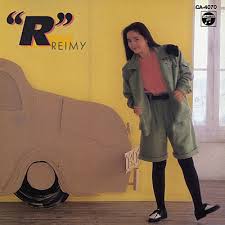We're here on the first Monday of 2022 and at least for my area, we're finally feeling what a proper January winter should be. It's sunny but cold, and thankfully the winds aren't whipping up so going out in multiple layers this morning kept me nice and toasty inside.
 |
| From columbia.jp |
Today I thought that we can start the week off with something warm and sweet, not unlike honey hot chocolate, and that would be pop singer Reimy(麗美)and her sophomore album "R" from September 1984 which ended up being her highest-rated release by hitting No. 6 on Oricon. Now, as I've mentioned in a past Reimy article or two, I've seen her through three phases: 1) her early high-toned pop period with help from the musical Matsutoyas, 2) a brief interregnum in the mid-1980s exploring West Coast dance-pop, and then 3) her mellow and introspective singer-songwriting time going into the 1990s. It was that last phase when I first heard her material.
I was fortunate to get my copy of "R" thanks to past KKP contributor JTM and with that 1984 release, the album falls under her early phase. Having a first listen, I was quite drawn to the first track "Kagami no Meiro (Strangled In Love)"(鏡の迷路...Mirror Maze). Written by Shun Taguchi(田口俊)and composed by Mayumi Horikawa(堀川まゆみ), Reimy's older sister, I can hear this as City Pop albeit somewhat different from the other representative examples of the time, but strangely enough, "Kagami no Meiro" also has hints of what Yumi Matsutoya(松任谷由実)was whipping up at the same time with those swift strings and certain keyboard work. Taguchi's lyrics talk of a woman having some romance issues but she's also struggling with life in the city, generally speaking.
Methinks that I may have mentioned this as well in past articles, but I had assumed that this early phase of hers was of Reimy as an aidoru singer just because of how cute she looked on her first album covers. But after listening to "Kagami no Meiro" and this second track "Sora ga Ichimen Umi ni Mieta Hi"(空が一面海に見えた日...The Day When The Sky Looked Like The Sea), perhaps all involved in the production felt that she was able to go full pop. And sure enough, Reimy composed "Sora ga Ichimen Umi ni Mieta Hi" alongside another Taguchi set of lyrics centered around the saying of "parting is such sweet sorrow". From the mention of a (military) base in those lyrics, I gather that the setting may even be Reimy's native Okinawa. It's a straight pop number with her vocals going right up high almost to the point of breaking.
I was surprised hearing "Koi no Ichiji-kan wa Kodoku no Sen-nen"(恋の一時間は孤独の千年...An Hour of Love Means a Thousand Years of Loneliness) since up to now, I'd only known Yuming's(ユーミン)rendition of it on her 1992 "Tears and Reasons" album, not knowing that it was actually a cover of the original that she gave Reimy for "R". The songwriter was responsible for words and music and I have to admit that I enjoy the "Tears and Reasons" version more because there is definitely more of that authentic samba flavour there whereas Reimy's original sounds more like a cute Casio synthesizer doing Latin.
"Carry On" is another Taguchi and big sister Mayumi concoction with a nice beefy bass underlying a dynamic dramatic melody about a woman wanting to get back into the swing of things after a sad period of life. Maybe it's some foreshadowing for Reimy's second phase.
My last contribution to "R" is the final track "Kaze wa Ashita e"(風は明日へ...The Winds For Tomorrow) which had Taguchi and Reimy working together again. As much as I have realized that Reimy was never an aidoru, "Kaze wa Ashita e" is about the closest to an aidoru tune from her high-pitched delivery and the happy and hopeful lyrics and music. A young woman is up on a mountain waxing wistfully about a young man she's fallen for although he's somewhere distant.
There are a couple of more tracks that I've actually written about in the past, both of them being Yuming-penned numbers: "Seishun no Regret"(青春のリグレット)and "Zansho"(残暑). "R" is quite the intriguing introduction to early Reimy considering how different she would sound half a decade later.

No comments:
Post a Comment
Feel free to provide any comments (pro or con). Just be civil about it.